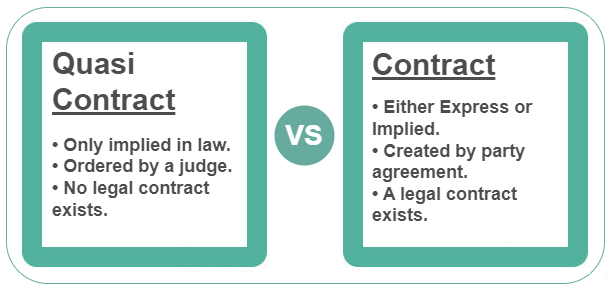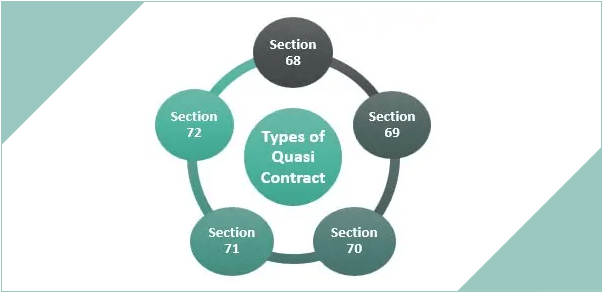Quasi Contract: Definition, Example, and RequirementsUnderstanding Quasi ContractsA quasi-contract refers to a measure that is often established to resolve any dispute between two or more parties when in fact, there is no contract legally between them. A quasi-contract is a judicially determined legal duty for one party to provide restitution to the other, unlike a typical contract. In other words, a Quasi Contract is a decision that is made to fix a situation of the past where one party gains something at the expense of the other. It is established by a judge and is implied in law. That is why it is also referred to as Implied-in-law Contract. Another name for this approach is a constructive contract, as it is constructed by a judge to resolve disputes between parties in the absence of a legal agreement or contract. 
The quasi-contracts or agreements may be imposed when a party accepts products or services that may not even have been requested. The giving party, therefore, expects payment due on acceptance. In this case, if the receiving party does not pay knowing that it should have paid, this creates a dispute and can be resolved by a quasi-contract made or ordered by a judge. A judge often considers what would happen if an agreement or contract had already been made between the parties and then proposes a settlement of the dispute, often suggesting a payment by the receiver to the giving party. In common-law states, quasi-contracts dated back to the middle ages and were first used to describe a legal action known as "Indebitatus Assumpsit" in Latin, which means "to be indebted" or "to have taken on a debt". Using this legal theory, the courts could force one party to pay the other as if there had previously been a contract or other agreement between them. Therefore, it is believed that the law implies that the defendant must abide by the terms of the trade. Since its inception, the quasi-contract has generally been used to impose reparation obligations. It would be decided that the defendant must compensate the plaintiff. Quantum meruit, or the quantity merited, is the Latin term for restitution, and it refers to the amount or degree to which the defendant has unjustly profited. It is to be noted that the court will only make a quasi-contract if there is no legal agreement or contract between the parties. If there would already be an agreement, there would be no reason to create a quasi-contract. Purpose of Quasi ContractThe purpose of a Quasi Contract is to prevent the unjust enrichment of one party at the expense of another party. It allows the courts to impose a legal obligation on a party to pay for a benefit it received, even if there was no contract between the parties. Quasi-contracts prevent situations where one party would receive a benefit for which they did not pay, which would be unfair and unjust for the other party. The purpose of a Quasi Contract is to ensure that parties are treated fairly and are not allowed to benefit from the work or services of others without compensation. It is another form of contract that promotes equality and fairness in contractual relations. The legality of Quasi ContractNeither party must consent to the agreement because it is created in a court of law and is, therefore, enforceable. When one side has an advantage over another, the quasi-contract is intended to provide a fair result for another party. The plaintiff, the person wronged, is entitled to receive compensation equal to the value of the thing (goods or service) from the defendant, the party who received it. Requirements for a Quasi ContractFor a Quasi Contract to be enforceable, certain requirements must be met. These include: The Benefit Conferred The party seeking to enforce the quasi-contract must have conferred a benefit on the other party. This benefit can be in the form of services, goods, or money. The Expectation of Payment The party conferring the benefit must have expected to be paid for the benefit it provided. This expectation can be implied by the circumstances or inferred from the parties' actions. Unjust Enrichment The party seeking to enforce the quasi-contract must show that the other party would be unjustly enriched if it did not pay for the benefit it received. In other words, the other party would receive a benefit for which it did not pay as expected. No Actual Contract The parties must not have any actual contract between them. If there is an actual contract, the court will enforce that legal contract rather than creating a quasi-contract. Difference between Quasi Contract and Contract
Quasi Contract
Contract
Differentiating Quasi-Contract and Contract with ExampleA quasi-contract, also known as an implied-in-law contract, is a legal theory in which a court imposes a contractual obligation on one party to prevent unjust enrichment of that party at the expense of another party. A quasi-contract arises from the parties' conduct and the circumstances of their relationship rather than from an express agreement. For example, if you hire a plumber to fix a leak in your home, but the plumber mistakenly goes to your neighbor's house and performs the work there. Although your neighbor did not request the service, he is obligated to pay for the service. This is because the plumber reasonably believed he was at the right address and the work benefited the neighbor on his approval; a court may impose a quasi-contractual obligation on your neighbor to pay for the services. In contrast, a contract is a legally binding agreement between two or more parties that creates mutual obligations enforceable by law. Contracts can be express, meaning that the terms are explicitly agreed upon by the parties, or implied, meaning that the terms are inferred from the parties' conduct. In the same example, let's say you and a plumber both signed a contract where the plumber was supposed to complete a task (i.e., fix a leak), and you were to pay for the service. Since the plumber has mistakenly provided services to your neighbor's address, you cannot be forced to pay for it. However, you can oblige the plumber to fix your work as per the agreement. Once the job is done, you will need to pay the plumber as agreed in the contract. Let us now understand the express and implied contract with an example: suppose you sign a lease agreement with your landlord, and the lease terms are explicitly agreed upon by both parties, making it an express contract. If you hire a taxi and pay the driver at the end of the ride, an implied contract exists between you and the driver, as the terms of the contract are inferred from your conduct and the circumstances surrounding the transaction. Types of Quasi ContractThere are basically five distinct categories of Quasi Contracts, which are defined under Sections 68 to Sections 72. They are as follows: 
Section 68: Supply of Necessities to Incapable PersonsA third party provides the goods to a person who is unable to sign contracts on his behalf due to reasons such as a lunatic or a minor person. In such a case, the property of the incapable person may be used by other parties (the man or woman who has furnished such resources) to get reimbursed for the expenses of goods or supplies. For example, suppose person A is a lunatic, and person B supplies him with the necessary goods/services that best suits his life situation. Now consider that person A does not have sufficient money to pay for the supply to person B and fails to do so. In that case, it can be treated as a quasi-contract, and person B is entitled to reimbursement from the property of person A. Section 69: Payment by Way of a Fascinated CharacterAny person, who makes a payment on behalf of another party who actually ought to have done so by law, is entitled to compensation from the other. Failure to do so will result in a quasi-contract resolution. For example, suppose Person A pays off a debt owed to another Person B. In such a case, the latter (i.e., person B) must reimburse A under the quasi-contract law. Section 70: Obligation to Pay Gratuitous Non-ActsThe recipient must pay the first party when the first party performs any legal activity for another person or deliver something without intending to do so gratuitously. Since the receiving party has enjoyed the benefits, it is bound to compensate the former party. It is also referred to as a quantum meruit quasi-contract. For example, suppose you hire a contractor to renovate your home but fail to sign a contract or agree on a price. In that case, the contractor can recover the reasonable value of the services on a quantum meruit basis if he has completed the work and you benefitted from it. Section 71: Responsibility of Finder of GoodsA person who discovers things that belong to another party and claims possession of them is subject to the same obligations as a Bailee. He should take care of the goods till a suitable owner is found. However, if the owner is not found, the finder may retain the item as his own in accordance with the quasi-contract. Section 72: Payment of Delivery via Mistake or CoercionA person forced into accepting a payment (receiving the money) or delivery of goods in error or under coercion must give it back. For example, if you mistakenly pay your neighbor's electricity bill instead of your own, your neighbor has received a benefit at your expense. It would be unjust for the neighbor to retain the benefit without compensating you. In this situation, a court may impose an obligation on your neighbor to reimburse you for the payment you made. Advantages and Disadvantages of Quasi ContractThe advantage of quasi-contracts is that they can help resolve disputes between parties where there is no legal agreement or contract between them. However, there are also some potential disadvantages to quasi-contracts. Let's look at some notable advantages and disadvantages: Advantages of Quasi Contracts
Disadvantages of Quasi Contracts
In summary, quasi-contracts can provide a legal remedy for situations without express agreement, but they can also be a source of legal disputes and uncertainty. The Bottom LineWhen a formal contract does not exist, a judge will make a quasi-contract as an agreement to resolve disputes after the event. A defendant must act by the terms of a quasi-contract with the plaintiff if one exists. It is made to prevent unfairly enriching one party at the expense of the other. Unjust enrichment is when someone gains unfairly from events or someone else's misery. |
 For Videos Join Our Youtube Channel: Join Now
For Videos Join Our Youtube Channel: Join Now
Feedback
- Send your Feedback to [email protected]
Help Others, Please Share









